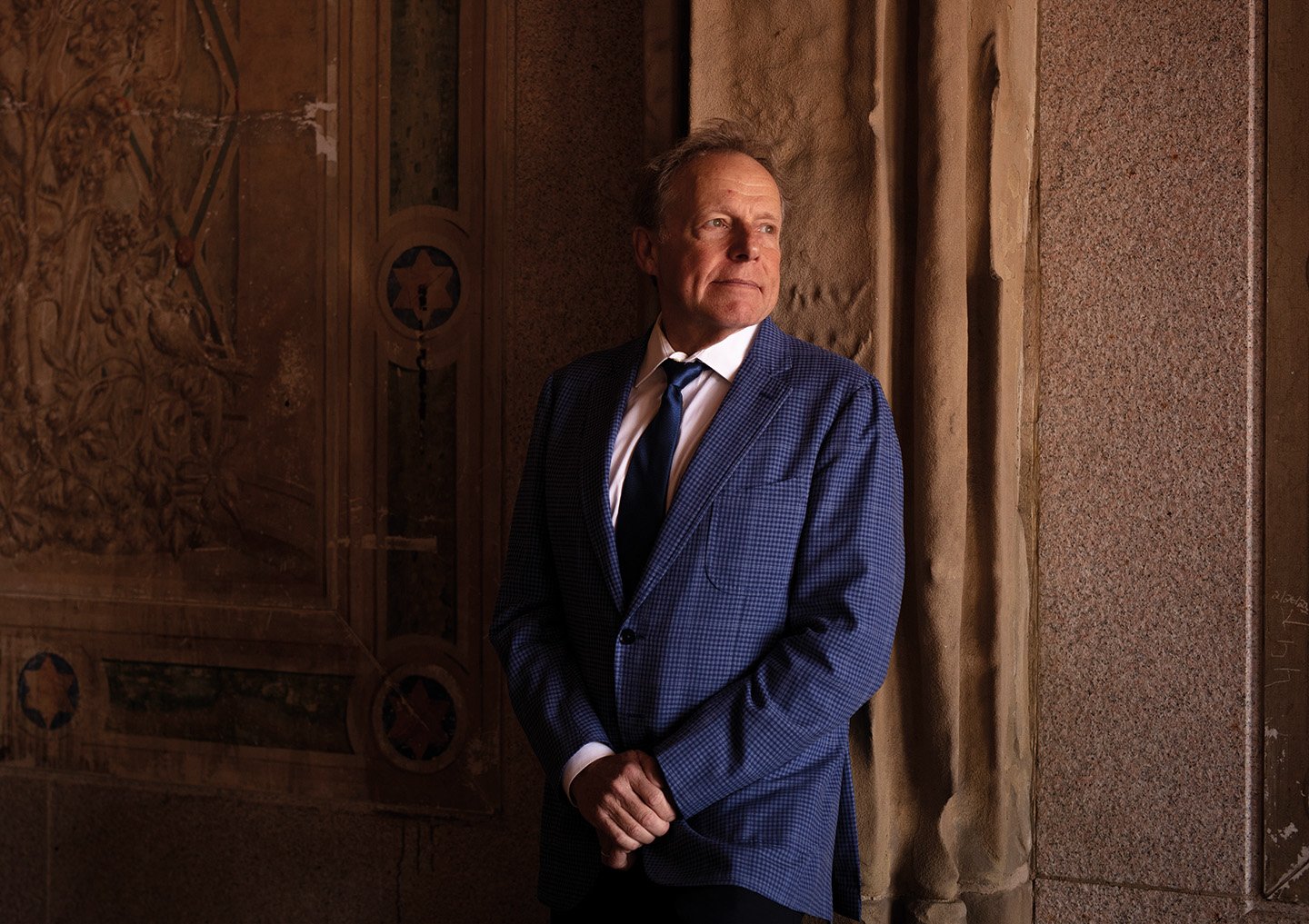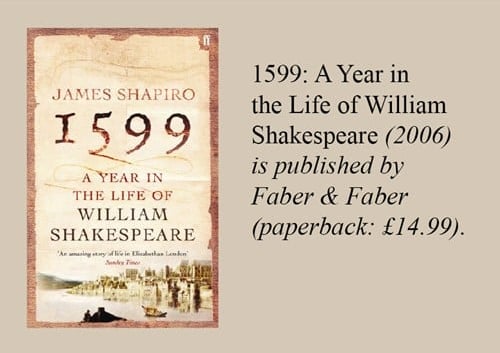
James Shapiro in the Bethesda Terrace Arcade, Central Park, New York City. Photography by Pascal Perich.
This article originally featured in Baillie Gifford’s Autumn 2023 issue of Trust magazine.
For centuries we thought of Shakespeare as a man out of time, scribbling away for posterity in his isolated attic. James Shapiro has changed that. The New Yorker stripped away romantic mystifications and misunderstandings to give us Shakespeare the hard-nosed entrepreneur and company man.
The extent of the makeover helped Shapiro’s 1599: A Year in the Life of William Shakespeare win this year’s Baillie Gifford Prize Winner of Winners award as the best work of non-fiction of the past 25 years. The judges described it as “an ingenious fusion of history, politics, and literary criticism”. The 2006 book restored the man from Stratford to his commercial and artistic time and place.
The Bard as businessman
“They don’t teach it in schools, but Shakespeare was a phenomenal businessman who saw opportunities that others did not, responding to technological advances in theatre and stage design,” Shapiro explains from his office at Columbia University in New York.
Determined to give a human face to timeless genius, Shapiro’s idea was to extrapolate a rounded picture from the “core sample” of a single breakthrough year. He chose the year the playwright hit his stride, producing Julius Caesar, Henry V and As You Like It and starting work on Hamlet.
Shapiro’s Shakespeare is a sponge, absorbing the news, gossip and intellectual hot topics and stirring them in to flavour his works-in-progress. The Earl of Essex’s campaign against Irish rebels, the threat of a Spanish invasion, a bust-up with the company’s top clown – they’re all reflected in those plays.
For Shapiro to tell such a readable story meant playing to his strength: “Sniffing out where the good stuff is in the archives, like a pig with truffles.”
For example, he revealed how Henry V’s rousing St Crispin’s Day speech, one of the most famous of all, partly rips off the rhetoric of a sermon glorifying Essex’s brutal and ill-fated campaign. Until Shapiro, no one in 400 years had unearthed the sermon and spotted the similarities in language. Nor had anyone placed Shakespeare in the room where the famous preacher spoke.
Gambling on the Globe
The building of the Globe Theatre also contributed to this make-or-break year. In an age when theatre companies were like medieval tradesmen’s guilds, his company, the Chamberlain’s Men, followed the joint-stock or shareholder model being pioneered by English merchants to underwrite ocean-going risk. It built its state-of-the-art “wooden O”, as the playwright nicknamed its oak-built circular design, squarely on the turf of its rival, the Rose.
“It was a risky move in a plague-ridden city but a successful one, as they drove out their competition,” Shapiro says.
“Making Shakespeare part-owner of the company and the playhouse, instead of the gig worker he had been, freed up his creativity and gave him the financial security and incentive to be creative.”
Much of the originality of 1599 lies in its projection of how Shakespeare made sense of a rapidly changing early modern world, bristling with religious and political angst, and how he brought his often illiterate audiences along for the ride.
Exploring the enigma
But who was he? Living in an unselfconscious age, Shakespeare kept no diary and nobody thought to preserve a mere actor-playwright’s letters. What we know comes from mentions in dry official records. On to this blank canvas, generations of scholars have projected their theories, from the ingenious to the unhinged.
Shapiro’s storytelling goes beyond reconstructing Shakespeare’s political prompts to his more banal – maybe more interesting – daily doings.
“I was trying to humanise Shakespeare, make him into an actual human being who has to get home from London to Stratford and back. How many days did it take? Who would accompany him? Where would he have gotten a horse? Those are the kind of questions that obsessed me.”
Not your average academic
Just as the Will Shakespeare of 1599 differs from the detached genius of legend, so Shapiro is unlike any caricature of a professor of early-modern literature who’s spent 30 years in dust-crusted archives. He’s proud of that.
“Like most scholars, I spent a lot of time at conferences, rubbing elbows with other tweedy academics. I stopped doing that 20 years ago when I saw opportunities, much like Shakespeare did in the late 1580s when he saw a career path most likely to lead to security and creative freedom.
“I wasn’t eager to write for 250 or 500 other academics, but to reach a larger audience you have to write not about what you are obsessed with but about what other people want to know, even if they’re not sure they want to know it.”
His first encounter with the subject of seven of his books had been disastrous: “We did Romeo and Juliet when I was 14, and I hated it. I didn’t even get the dirty bits my classmates sniggered at. I swore I’d never study Shakespeare again.”
It was discovering the plays in performance as a student backpacker to London and Stratford-upon-Avon in the 1970s and 80s that nurtured his obsession. Every summer he would take cheap transatlantic flights to steep himself in the plays.
Much as he enjoys his teaching duties, he spends a good deal of time spreading the lessons of the poetry and plays in rehearsal rooms, schools and prisons and at prestigious business and political gatherings.
Shakespeare our contemporary
Shapiro's Bard is very much alive – and politically active. In his most recent book, Shakespeare in a Divided America (2020), Shapiro charts the many ways in which the plays have influenced US history. For example, he shows how Macbeth and other tragedies comforted Abraham Lincoln during the Civil War, while inflating the heroic fantasies of his assassin, John Wilkes Booth. The cracked actor saw himself as Brutus to the president’s Julius Caesar.
That play crops up again when a distinctly Trump-like tyrant was ‘murdered’ in a 2017 New York production, provoking a new skirmish in the US’s seething culture wars.
It was one contemporary example, Shapiro says, of how the author “continues to influence how we make sense of the world”. Through his ingenious recreation of a single year, his prize-winning achievement has been to help us make better sense of Shakespeare.
Comedy of errors
Myths and misunderstandings slain by Shapiro:
He worked alone: No, Shakespeare collaborated on at least six of the plays ascribed to him, both early and late ones.
He made up lots of stories: No again. Out of 38 plays, only A Midsummer Night’s Dream and The Tempest are entirely original.
He didn’t write the plays at all: Shapiro’s Contested Will (2010) elegantly demolishes the cranky theories that Francis Bacon, or the Earl of Oxford, or many others, wrote ‘Shakespeare’.
A string of hits made him rich: No, playwrights earned peanuts. A share in management allowed him to retire early. After that, he got into property and hoarding barley.


Important information
Baillie Gifford & Co and Baillie Gifford & Co Limited are authorised and regulated by the Financial Conduct Authority (FCA). Baillie Gifford & Co Limited is an Authorised Corporate Director of OEICs.
Baillie Gifford Overseas Limited provides investment management and advisory services to non-UK Professional/Institutional clients only. Baillie Gifford Overseas Limited is wholly owned by Baillie Gifford & Co. Baillie Gifford & Co and Baillie Gifford Overseas Limited are authorised and regulated by the FCA in the UK.
Persons resident or domiciled outside the UK should consult with their professional advisers as to whether they require any governmental or other consents in order to enable them to invest, and with their tax advisers for advice relevant to their own particular circumstances.
Financial intermediaries
This communication is suitable for use of financial intermediaries. Financial intermediaries are solely responsible for any further distribution and Baillie Gifford takes no responsibility for the reliance on this document by any other person who did not receive this document directly from Baillie Gifford.
Europe
Baillie Gifford Investment Management (Europe) Ltd (BGE) is authorised by the Central Bank of Ireland as an AIFM under the AIFM Regulations and as a UCITS management company under the UCITS Regulation. BGE also has regulatory permissions to perform Individual Portfolio Management activities. BGE provides investment management and advisory services to European (excluding UK) segregated clients. BGE has been appointed as UCITS management company to the following UCITS umbrella company; Baillie Gifford Worldwide Funds plc. BGE is a wholly owned subsidiary of Baillie Gifford Overseas Limited, which is wholly owned by Baillie Gifford & Co. Baillie Gifford Overseas Limited and Baillie Gifford & Co are authorised and regulated in the UK by the Financial Conduct Authority.
South Korea
Baillie Gifford Overseas Limited is licensed with the Financial Services Commission in South Korea as a cross border Discretionary Investment Manager and Non-discretionary Investment Adviser.
Japan
Mitsubishi UFJ Baillie Gifford Asset Management Limited (‘MUBGAM’) is a joint venture company between Mitsubishi UFJ Trust & Banking Corporation and Baillie Gifford Overseas Limited. MUBGAM is authorised and regulated by the Financial Conduct Authority.
Australia
Baillie Gifford Overseas Limited (ARBN 118 567 178) is registered as a foreign company under the Corporations Act 2001 (Cth) and holds Foreign Australian Financial Services Licence No 528911. This material is provided to you on the basis that you are a “wholesale client” within the meaning of section 761G of the Corporations Act 2001 (Cth) (“Corporations Act”). Please advise Baillie Gifford Overseas Limited immediately if you are not a wholesale client. In no circumstances may this material be made available to a “retail client” within the meaning of section 761G of the Corporations Act.
This material contains general information only. It does not take into account any person’s objectives, financial situation or needs.
South Africa
Baillie Gifford Overseas Limited is registered as a Foreign Financial Services Provider with the Financial Sector Conduct Authority in South Africa.
North America
Baillie Gifford International LLC is wholly owned by Baillie Gifford Overseas Limited; it was formed in Delaware in 2005 and is registered with the SEC. It is the legal entity through which Baillie Gifford Overseas Limited provides client service and marketing functions in North America. Baillie Gifford Overseas Limited is registered with the SEC in the United States of America.
The Manager is not resident in Canada, its head office and principal place of business is in Edinburgh, Scotland. Baillie Gifford Overseas Limited is regulated in Canada as a portfolio manager and exempt market dealer with the Ontario Securities Commission (‘OSC’). Its portfolio manager licence is currently passported into Alberta, Quebec, Saskatchewan, Manitoba and Newfoundland & Labrador whereas the exempt market dealer licence is passported across all Canadian provinces and territories. Baillie Gifford International LLC is regulated by the OSC as an exempt market and its licence is passported across all Canadian provinces and territories. Baillie Gifford Investment Management (Europe) Limited (‘BGE’) relies on the International Investment Fund Manager Exemption in the provinces of Ontario and Quebec.
Israel
Baillie Gifford Overseas Limited is not licensed under Israel’s Regulation of Investment Advising, Investment Marketing and Portfolio Management Law, 5755–1995 (the Advice Law) and does not carry insurance pursuant to the Advice Law. This material is only intended for those categories of Israeli residents who are qualified clients listed on the First Addendum to the Advice Law.
58637 10035689




